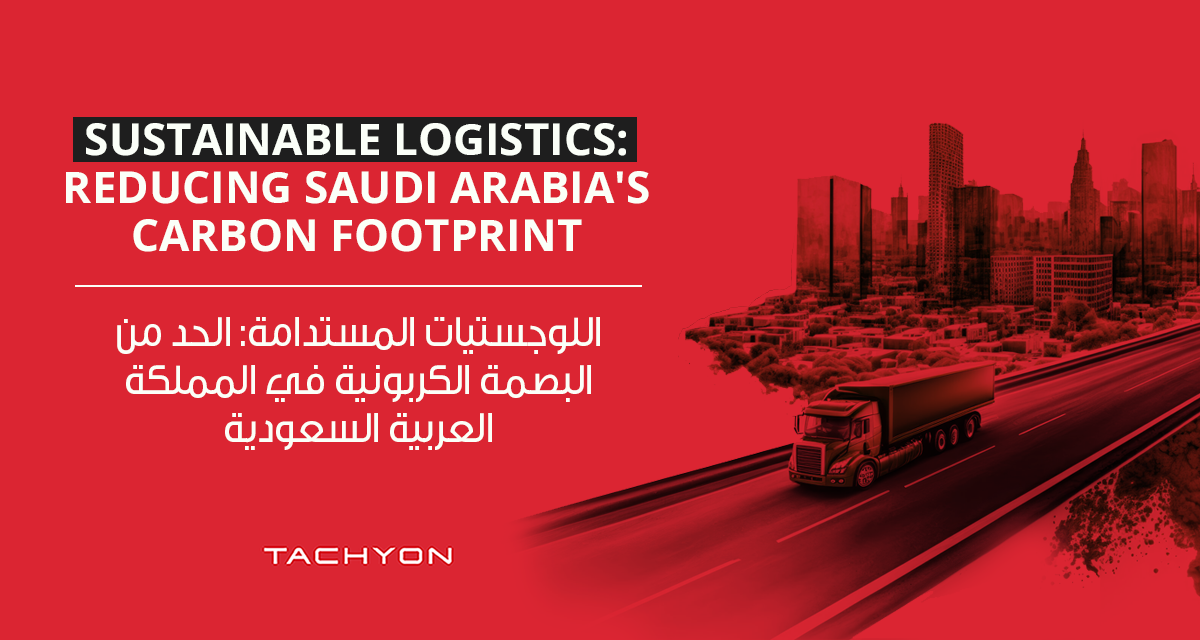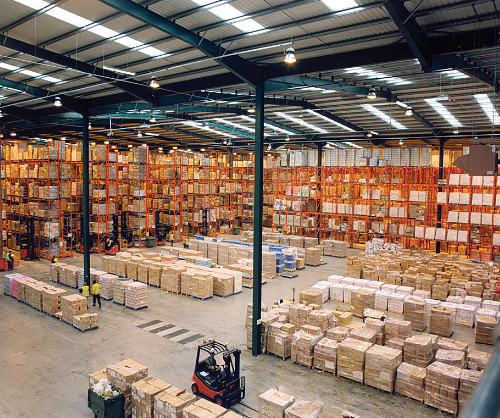Tachyon news
Blog
Sustainable Logistics: Reducing Saudi Arabia’s Carbon Footprint

We love our planet. To value its sources is our foremost duty. Every business sector is trying to encourage sustainable practices for a better and greener future. Tachyon is also on this mission, considering it its social responsibility. We are developing more and more sustainable practices and technologies to reduce carbon footprints in Saudi Arabia. We are employing the best measures to take the logistics industry in Saudi Arabia to sustainable standards. It is the need of the hour to maximize our strategies to reduce carbon footprint emissions in the environment. For this, we are consistently working in an eco-friendly logistics operation. We have launched a digital platform to provide our tech-infused logistics services in Saudi Arabia. Let’s explore why sustainable logistics are needed in our society.
What are sustainable logistics?
Sustainable logistics reduce environmental impact in logistics, freight, and transportation. Implementing sustainability in logistics services involves:
- Assessing the overall strategy.
- Optimizing travel routes.
- Incorporating renewable energy or technology.
- Avoiding wasted energy.
- Introducing recyclable packaging.
- Using integrated logistics.
- Considering greener transport options.
How Tachyon is working to make logistics more sustainable
Our goal is to create more sustainable logistics in the future. By 2030, we want to have zero net emissions. We intend to accomplish this by concentrating on decarbonizing client supply chains. We encourage the idea of launching the first container ships powered by green methanol. The task has already started with investments in green technologies and fuels, responsible ship recycling, and more economical resource use.
Increasing the sustainability of our processes in all operations is swiftly becoming a top concern for all shipping stakeholders. We spoke with some aspiring business owners about their entrepreneurial journeys, learning how they incorporated sustainability into their operations and why it matters so much to them.
We have compiled the following list of the best ways to be sustainable:
- When sourcing your goods and resources, use nearby vendors.
- Incorporate recycled resources into your operations and goods.
- When feasible, employ renewable technologies or energy sources.
- Reduce the amount of waste you produce by eliminating extraneous packaging, recycling, reusing, and switching to digital whenever possible.
Best practices in logistics sustainability
Businesses are seeking methods to enhance the environmental performance of their supply chains as the imperative for sustainability increases. While every aspect of logistics management impacts sustainability, the three fundamental components—procurement, transportation, and warehousing—require best practices in logistics sustainability. We will explain how we are implementing these best practices.
Purchasing and procurement
Logistics and supply chain leaders realize the importance of sustainability in purchasing and procurement. We collaborate with suppliers and value-chain partners on sustainability schedules. To achieve this, we have highlighted developing responsible sourcing programs that include concerns related to people, the planet, profit, and potential risk issues. Our best practices observed in purchasing and procurement include conducting regular sustainability audits for new and existing suppliers. We are also giving financial incentives to suppliers for sustainability efforts.
Transportation
We are executing innovative approaches to improve transportation sustainability, focusing on reducing carbon emissions within the supply chain. These include reducing empty miles, using alternative fuel automobiles, adopting electric vehicle technology, and optimizing equipment routing and scheduling.
Urban delivery vehicles are predicted to increase emissions by 30% by 2030. The government is introducing new strategies to reduce emissions. Amazon uses artificial intelligence to determine the optimal size of boxes for shipments, reducing outbound packaging by 33% in five years. Retail stores like Walmart add fulfillment space to existing stores to minimize last-mile delivery costs. Transport companies are using multi-trailers with a single power unit.
End-to-end transportation management systems (TMS) that include sustainability considerations are being adopted to minimize travel distances and improve service levels. Tachyon TMS can incorporate sustainability issues when calculating equipment capacities, maximizing equipment, and reducing empty miles.
Warehousing
Warehousing practices are essential to sustainability, ensuring products are protected from contamination and waste. A well-planned distribution network can reduce the need for additional equipment and facilities. Green solutions have been implemented to reduce waste and costs, such as upgrading lighting, stormwater management, electric forklifts, and solar power. Our innovative approaches include:
- Developing nearshoring and local sourcing strategies.
- Using multifunction forklift trucks.
- Designing warehouses and distribution centers to minimize their carbon footprint.

Why is sustainable logistics the need of the future?
Multiple sectors are continuously changing as a result of the global events that are taking place right now. The developments in the logistics sector are also visible to you. Sustainable logistics is the way of the future because so many transportation and logistics organizations are working to save the environment by applying new ideas.
The Earth is in serious danger if we keep going in the direction we are going in terms of trash and carbon emissions. Because of this, most developments, particularly in cargo and freight, are concentrated on sustainable development that would lower the carbon footprint. Many firms are doing the right thing by implementing economical and environmentally practical approaches. This can expedite orders as well without endangering the environment. There are a few strategies that shipment and logistics organizations can use to transition to more sustainable choices more quickly.
Infrastructure Upgrades and Digital Transformation
Significant delays in logistical operations are caused by weak infrastructure and poor connectivity. Because of this, Saudi Arabia is currently modernizing its maritime networks and updating its rail systems to provide a smooth logistical process. It must develop its infrastructure.
The profitability of several industries, mainly retail, healthcare, food and beverage, and automobiles, has improved due to digitizing. The overall market share of logistics in the Kingdom of Saudi Arabia is impressive and is projected to increase until it is fully digitalized, resulting in a smooth operation that a variety of sectors can utilize. Customers have become reliant on contactless services since they are more convenient, quicker, and less expensive since the COVID-19 pandemic. Due to the entry of new industries, the e-commerce sector in KSA is likely to continue growing at a spectacular rate in the future.
The primary reason sustainable logistics is the need of the future is that it will contribute to reducing greenhouse gas emissions. Middle Eastern logistics firms are also adopting and utilizing these technologies. We must understand that there is just one Earth that needs to be saved. You will discover that most of the strategies for lowering the carbon footprint discussed are not that difficult or expensive to implement. As a consumer, you should constantly try to find shipping firms that will manage your shipment according to the most recent environmentally friendly regulations.
Sustainable logistics is the way to future prosperity because of renewable energy options. When it comes to shipping, there are a lot of solutions available right now called “green options.” Deliveries of goods can be made using hybrid cars rather than diesel or gasoline-powered ones and ocean freight to Saudi Arabia. Certain logistics organizations are using fleet supervision and tracking systems with GPS capabilities. These systems will offer automobile reports, allowing you to view your car’s complete inspections. Keeping your tires inflated to the recommended pressure will help you save fuel.
How are we reducing carbon emissions?
We use methods to improve the overall efficiency of warehouse performance. Pop-up warehouses have the potential to save expenses and emissions while also speeding up deliveries. We also employ air cargo to deliver your goods to Saudi Arabia, which would save you money and time. In recent years, on-demand warehousing has increasingly gained popularity. As more online firms connect with the existing warehouses, they find themselves in need of rental space.
An increasing number of warehouses are attempting to automate processes wherever possible. We are promoting these approaches through our logistics operations. This implies that other automobiles, such as cranes, trucks, and drones, are more automated and run without a driver. Drones are a very useful tool in today’s logistics sector. They play a necessary role in managing the inventory in the warehouse and offering assistance in many capacities. You won’t be shocked if transport and shipping are handled by drones in the near future. They can reach a wide range of areas, regardless of whether they are rural or urban.

The benefits of sustainable logistics
The advantages of sustainable logistics are important and multiple. People should understand the potential impact on the environment. To get the best outcomes, we must each contribute in some way. We must direct the technology in a sustainable direction now that we have both the resources and the means.
Since reducing CO2 emissions has many advantages and will benefit us greatly, it should be a top priority. Particular items are shipped from one place to another in every conveyance. Every vehicle uses fossil fuels, which results in significant emissions. In this situation, we should move to alternatives with lower carbon dioxide emissions, such as electric cars. We need to develop a sustainable solution, even if we move to maritime transportation. Another item that many businesses should think about is how their operations fit in with the legislative goals and rules. The reduction of anything harmful to our planet is the sole objective of these approaches. We have to protect our planet from carbon footprints.
Increasing understanding among customers is another essential aspect of the entire process. Fortunately, many are now conscious of certain companies’ products and business practices. All because of social media, which had a big influence. We must take action, and businesses must take all the required measures to lower their carbon footprint. This is the only action we can take as a team to save our world.
Frequently Asked Question
What is Saudi Arabia doing to reduce carbon emissions?
Saudi Arabia is investing in renewable energy sources like solar power and implementing energy efficiency measures to cut emissions.
Can you reduce the carbon footprint of logistics?
Yes, we can reduce the carbon footprint of logistics by optimizing routes and using eco-friendly vehicles. Tachyon is improving supply chain efficiency in Saudi Arabia with sustainable practices and technology.
What is Saudi Arabia’s environmental sustainability strategy?
Saudi Arabia’s environmental sustainability strategy focuses on renewable energy investment and reducing carbon emissions through different initiatives and policies.
How can we reduce transport carbon footprints?
We can reduce our transport carbon footprint by promoting public transportation, using fuel-efficient vehicles, and adopting electric and hybrid cars.



